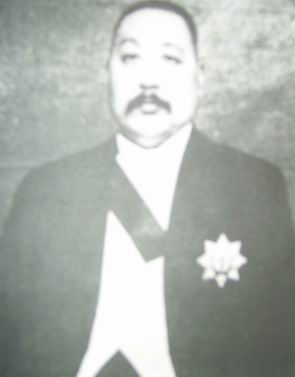- Gao Lingwei
Infobox President
name = Gao Lingwei
imagesize =
caption =
order =
office =President of the Republic of China
Premier of the Republic of China
spouse =
nationality =ChineseGāo Língwèi (高凌霨,
Wade-Giles Kao Ling-wei) (1868-1939) was a Chinese politician during the lateQing dynasty and theRepublic of China .A
Tianjin native, he was appointed toHubei where he held many offices relating to finance and education including a stint as superintendent of the provincial military academy. There he became a protege ofZhang Zhidong in China's modernization effort and was appointed governor ofHunan .After the
Xinhai Revolution broke out at Hubei, he returned to Tianjin and help modernize the banking system. He later became minister in many militarist cabinets. In 1923, he became the Acting President whileCao Kun was "campaigning" for the presidency by bribing the National Assembly. He served briefly as Cao's first premier.In 1935, he became the Mayor of Tianjin. During the
Second Sino-Japanese War , he collaborated with the invaders in exchange for the governorship ofHebei .Biography
Gao Lingwei was born in
Tianjin in 1868. He successfully passed the literary examinations and was afterwards assigned to the province of Hubei for official appointment. He was the sub-director of the High School of the Chin Hsin College, and superintendent of the Military Academy in Hubei. Later he became the director of the Hubei Government Mint. While holding the position of Viceroy of Hunan and Hubei,Zhang Zhidong ordered the establishment of an arsenal, industrial plants and copper and silver mints, and also encouraged the establishment of learning in his territory. Gao Lingwei participated in all these activities to the satisfaction of the great Viceroy. In 1906 he was promoted to be the Commissioner of Education in Hubei. It was at a time when the Central Government tried to concentrate power in Beijing and local finances were consequently stringent and the fund for education became very scant. In such circumstances Gao Lingwei accepted the new appointment, but in a few months he was able to increase the number of schools in that province by ten and find the necessary funds for the purpose. In 1909 Gao Lingwei was promoted to be the Provincial Treasurer, a very high provincial appointment at that time. After serving in that important capacity for some time, one of his parents died, and according to the acient custom, he had to retire from official duties for three years. Then, the first revolution came in 1911, and Gao Lingwei went to Tianjin to continue living in retirement. During his retirement in Tianjin, at the request of his friends, he did all he could to direct the organization of banks along modern lines in the different parts of the country. In August 1913 Gao Lingwei was appointed as the Acting Chief of the Financial Bureau of Chihli. In September 1913 he was ordered to act concurrently as Chief of the Preparation Bureau for the Collection of National Taxes in Chihli. He was relieved of these two posts in April 1914. In 1915 Gao Lingwei was the High Advisor to the Office of the Tuchun of the Three Eastern Provinces. In August 1917, a new Parliament was convened and Gao Lingwei became a member of it from Chihli. In August 1920 Gao Lingwei was appointed as the Vice-Minister of Agriculture and Commerce. In January 1921 he received the Second Class Tashou Chiaho. In July 1921 he was appointed as the Vice-President of the Bank of Agriculture and Commerce. In October 1921 he was appointed as the Minister of Finance and awarded the First Class Tashou Chiaho. In November 1921 he was ordered to become the concurrent Director General of the Currency Bureau and also the Director General of the Salt Administration. In December 1921, he was transferred to become the Minister of the Interior. In this capacity he served in January 1922 the following concurrent positions: Director-General of Famine Relief; Director General of the Metropolitan Municipal Administration; and President of the Yangtze Rier Commission. In March 1922 Gao Lingwei was awarded the First Class Wenfu. In May 1922 he was ordered to act concurrently as Minister of Communications. This acting post was only held by him for half a month. In June 1922 Gao Lingwei was relieved of the portfolio of the Interior. On the 18th of the same month he was appointed to be the Civil Governor of Chihli, but he did not assume office and on the 24th he was relieved of the post of governor. In August 1922 he was appointed as the Acting Minister of Finance, in September he was transfeered to become the Acting Minister of Agriculture and Commerce. In October 1922 Gao Lingwei was awarded the First Class Tashou Paokuang Chiaho. In November 1922 he was transferred to be the Acting Minister of the Interior. In January 1923 he was appointed as the Minister of the Interior. In February he was ordered to hold concurrently the Presidency of the Yangtze River Commission. In October 1923 Gao Lingwei was appointed to act as the Premier of China. This position was held by him until January 1924, when he was appointed to be the Director General of the Dustoms Administration to succeed Sun Paochi, who had been appointed as the Premier.
Wikimedia Foundation. 2010.
